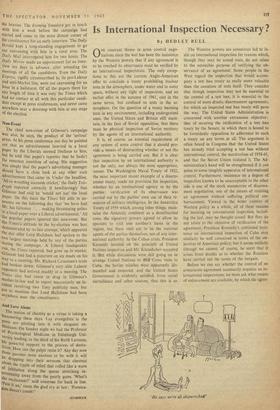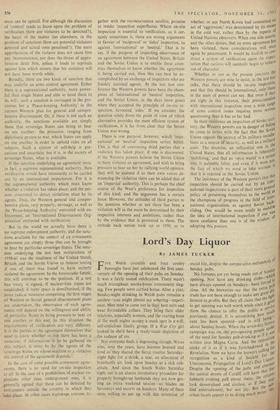Is International Inspection Necessary?
By HEDLEY BULL
ONE constant theme in arms control nego- tiations since the war has been the insistence by the Western powers that if any agreement is to be reached its observance must be verified by an international inspectorate. The only excep- tions to this are the current Anglo-American offer to conclude a treaty prohibiting nuclear tests in the atmosphere, under Water and in outer space, without any right of inspection; and an earlier offer in the autumn of 1961, cast in the same terms, but confined to tests in the at- mosphere. On the question of a treaty banning tests in any environment, including underground ones, the United States and Britain still main- tain, in the face of Soviet opposition, that there must be physical inspection of Soviet territory by the agents of an international authority.
It is, of course, an essential requirement of any system of arms control that it should pro- vide a means of determining whether or not the agreement is being carried out. But it is clear that inspection by an international authority is not the only, nor always the most appropriate, means. The Washington Naval Treaty of 1922, the most important recent example of a disarm- ament treaty, made no provision for inspection, whether by an international agency or by the parties: verification of its observance was carried out by the parties' own use of their re- sources of military intelligence. In the Antarctica Treaty of 1959 which, among other things, main- tains the Antarctic continent as a demilitarised zone, the signatory powers agreed to allow in- spectors to visit one another's bases in the region, but these men are to be the national agents of the parties themselves, not of any inter- national authority. In the Cuban crisis, President Kennedy insisted on the principle of United Nations inspection and Mr. Khrushchev accepted it. But while discussions were still going on to arrange United Nations or RR Cross visits to Cuba, the Soviet missiles were apparently dis- mantled and removed; and the United States Government is evidently satisfied, from aerial surveillance and other sources, that this is so. The Western powers are sometimes led to in- sist on international inspection for reasons which, though they may be sound ones, do not relate to the ostensible purpose of verifying the ob- servance of an agreement. Some people in the West regard the inspection that would accom- pany a test ban treaty as really more valuable than the cessation of tests itself. They consider that though inspection may not be essential to the control of a test ban, it is essential to the control of more drastic disarmament agreements, for which an inspected test ban treaty will pave the way. The United States Administration is concerned with another extraneous objective: that of securing the ratification of a test ban treaty by the Senate, in which there is bound to be formidable opposition to adherence to such a treaty on any terms at all. The argument is often heard in Congress that the United States has already tried accepting a test ban without international control, the moratorium of 1958-61, and that the Soviet Union violated it. The Ad- ministration's hand will be strengthened if it can point to some tangible apparatus of international control. Furthermore, insistence on a degree of inspection known to be unacceptable to the other side is one of the stock manoeuvres of disarma- ment negotiation, one of the means of resisting an agreement without suffering political em- barrassment. Viewed in the wider context of Western policy as a whole, all of these reasons for insisting on international inspection, includ- ing the last, may be thought sound. But they do not relate to the objective of verification of the agreement. President Kennedy's continued insis- tence on international inspection of Cuba may similarly be well conceived in terms of the ob- jectives of American policy; but it seems unlikely (though we cannot, of course, be sure) that it arises from doubts as to whether the Russians have carried out the terms of the bargain.
Before we can say whether the control of an armaments agreement necessarily requires an in- ternational inspectorate, we must ask what means of enforcement are available, by which the agree- 'He says we're all shipwrecked.' ment can be upheld. For although the discussion of 'control' tends to focus upon the problem of verification (how are violators to be detected?), the heart of the matter lies elsewhere, in the problem of sanctions (how are potential violators deterred and actual ones penalised?). The mere apprehension of the violator does not cause him any inconvenience, nor does the threat of appre- hension deter him, unless it leads to reprisals against him which ensure that his violation will not have been worth while.
Broadly, there are two kinds of sanction that may underlie an arms control agreement. Either there is a supranational authority, more power- ful than single States and able to bend them to its will: such a sanction is envisaged in the pro- visions for a 'Peace-keeping Authority' in the current Western plan for general and compre- hensive disarmament. Or, if there is not such an authority, the sanctions available are simply those that sovereign States can bring to bear on one another: the pressures, ranging from diplomatic protest to war, which States can apply on one another in order to uphold rules on all subjects. Such a system of self-help is pre- carious and uncertain; but it is, in the society of sovereign States, what is available.
If the sanction underlying an agreement were, in fact, a supreme supranational authority, then verification would have necessarily to be carried out by an international inspectorate. For it is the supranational authority which must know whether a violation has taken place; and the per- sons concerned to detect violations must be its agents. Thus, the Western general and compre- hensive plans, very properly, envisage, as well as the 'Peace-keeping Authority' entrusted with en- forcement, an `International Disarmament Org- anisation' entrusted with verification.
But in the world we actually have there is no supreme enforcement authority, and the sanc- tions available for the control of an armaments agreement are simply those that can be brought to bear by particular sovereign States. The sanc- tion underlying the test ban moratorium of 1958-61 was the readiness of the United StateS, Britain and the Soviet Union to resume testing if one of them was found to have secretly violated the agreement. In the foreseeable future; this will continue to be the position. If a test ban treaty is signed, if nuclear-free zones are established, if outer space is demilitarised, if the more radical measures comprising the•first stages of Western or Soviet general disarmament plans are undertaken, the observance of such agree- ments will depend on the willingness and ability of particular States to bring pressure to bear on one another to, this end. In this situation the requirements of verification are very different. It is the parties to the agreement themselves that need to know whether or not there has been a violation; if information is to be gathered on this subject, it must be by the agents of the sovereign States on whose reaction to a violation the control of the agreement depends.
In the case of some possible armaments agree- ments, there is no need for on-site inspection at all. In the case of a prohibition of nuclear ex- plosions other than underground ones, it is generally agreed that these can be detected by instruments outside the country in which they `take place. In other cases espionage sources, to-
gether with the reconnaissance satellite, promise to render inspection superfluous. Where on-site inspection is essential to verification, as it cer- tainly sometimes is, there are strong arguments in favour of 'reciprocal' or 'sides' inspection, as against International' or 'neutral.' That is to say, if the purpose of inspecting observance of an agreement between the United States, Britain and the Soviet Union is to enable these coun- tries themselves to know whether the agreement is being carried out, then this can best be ac- complished by an exchange of inspectors who are frankly national agents. At the test ban con- ference the Western powers have been the cham- pions of 'international' or 'neutral' inspection; and the Soviet Union, in the days (now gone) when they accepted the principle of on-site in- spection, favoured 'sides.' If we consider the question solely from the point of view of which alternative provides the most efficient system of verification, it is far from clear that the Soviet Union was wrong.
There is one purpose, however, which 'inter- national' or 'neutral' inspection serves better. This is that of convincing third parties that a violation has taken place, if one is discovered. If the Western powers believe the Soviet Union to have violated an agreement, and wish to bring pressure to bear on her by rallying world opinion, they will be assisted if to their own voices de- nouncing the violation there can be added that of an 'impartial' authority. This is perhaps the chief source of the West's preference for inspection of this kind; and the argument has a certain force. However, the attitudes of third parties to the question whether or not there has been a violation will in the main be determined by their respective interests and ambitions, rather than by the evidence that is presented to them. The attitude each nation took up in 1950, as to whether or not North Korea had committed an act of `aggression, '• was determined by its stance in the cold war, rather than by the reports of United Nations observers: When one side asserts, and the other denies, that an arms agreement has been violated, these considerations will once again be paramount. It would be foolish to con- struct a system of verification upon the exPee" tation that nations will suddenly begin to behave out of character. Whether or not at the present juncture the Western powers are wise to insist, in the test ban talks, that there should be on-site inspection, and that this should be international, only those in the seats of power can say. But even if they are right in this instance, their preoccupation with international inspection over a wide range of arms control issues requires more serious questioning than it has so far had. In their insistence on inspection of Soviet terri- tory, the Western powers are in danger of failing to come to terms with the fact that the Soviet Union regards the secrecy of its military installa- tions as a source of security, as well as a military asset. The doctrine, an influential one in the United States, that all information is inherenuY `stabilising,' and that an "opzn world' is a secure one, is palpably false; and even if it were rw!' the fact of which we need to take account is that it is rejected in the Soviet Union.
The insistence of the Western powers that this inspection should be carried out by an
national inspectorate is part of their more general policy of presenting themselves to the world as the champions of progress in the field of inter" ,,, national organisation, as against Soviet back- sliding. One would be more ready to end the idea of international inspection if one woaf more confident than one is of the wisdom adopting this posture.







































 Previous page
Previous page